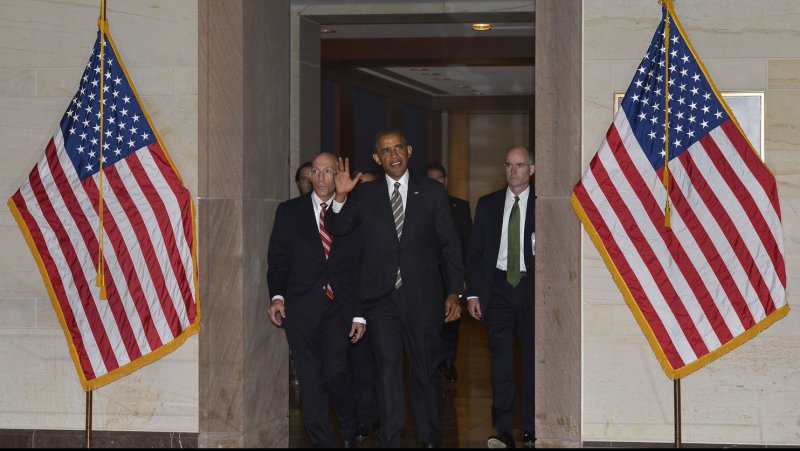US President Barack Obama waves to the presss as he arrives at the US Capitol for talks with House Democrats, July 31, 2013, in Washington, DC. UPI/Mike Theiler |
License Photo
WASHINGTON, Aug. 1 (UPI) -- The Obama administration says it takes privacy criticisms over its surveillance programs seriously while defending them to Congress and the U.S. public.
Obama met Thursday with a bipartisan group of lawmakers -- both critics and supporters -- to discuss surveillance activities of the National Security Agency. Also, NSA Director Gen. Keith Alexander was on Capitol Hill to answer House lawmakers' questions in a classified briefing before the August recess, The Hill reported.
"Today's meeting was constructive and the President committed that he and his team would continue to work closely with the Congress on these matters in the weeks and months ahead," the White House said in a statement.
"We will continue to work through the August recess on proposals to improve transparency and strengthen privacy protections to further build the confidence of the American public in our nation's counterterrorism programs," the lawmakers said in a joint statement.
The administration's efforts attempt to show officials take the privacy criticisms seriously as they defend the overall position by highlighting the protections in place. The efforts come as lawmakers are considering proposals to curb the NSA's powers.
The administration's efforts at reassurance faced another test Wednesday when information supplied by NSA leaker Edward Snowden and published by British newspaper The Guardian purported to show how analysts search databases of people's email, online chat and browsing histories without prior court authorization.
In a meeting with Senate Democrats, one senator said Obama was willing to discuss potential reforms to the NSA, which also was the topic of Thursday's discussions with lawmakers.
Also Wednesday, James Clapper, director of national intelligence, declassified several documents about the government's phone data collection program.
The administration's efforts to address privacy concerns came a week after the House narrowly defeated an amendment from Rep. Justin Amash, R-Mich., that would have sharply curbed the NSA's controversial collection of phone records.
However, during a Senate Judiciary Committee hearing Wednesday, NSA Deputy Director John Inglis said U.S. bulk phone records spying was key in stopping just one terror plot, not the dozens officials had earlier said.
Judiciary Committee Chairman Patrick Leahy, D-Vt., accused Obama administration officials of overstating the successes of the far-reaching counter-terrorism program.
Leahy questioned earlier testimony by Alexander and other senior intelligence officials asserting the phone surveillance helped thwart 54 terrorist events.
Leahy told Inglis he realized after reviewing NSA material that assertion couldn't be made, "not by any stretch."
He said the NSA material didn't indicate "dozens or even several terrorist plots" had been thwarted by the domestic program.
Inglis admitted the phone-interception program "made a contribution" to discovering 13 domestic plots but was only critical in thwarting one -- a plot he described as a "but for" case.
That case was a September 2009 suicide-bomb plot to wreak havoc in the New York City subway system, Inglis told the committee.
During the hearing, Leahy said the program has "massive privacy implications."
"The phone records of all of us in this room -- all of us in this room -- reside in an NSA database," he said. "I've said repeatedly, just because we have the ability to collect huge amounts of data does not mean that we should be doing so."
"If this program is not effective, it has to end," Leahy said. "So far, I'm not convinced by what I've seen."
Administration officials defended the collection effort and the PRISM program as critical to U.S. security yet carefully monitored.
"With these programs and other intelligence activities, we are constantly seeking to achieve the right balance between the protection of national security and the protection of privacy and civil liberties," Deputy Attorney General James Cole said. "We believe these two programs have achieved the right balance."















